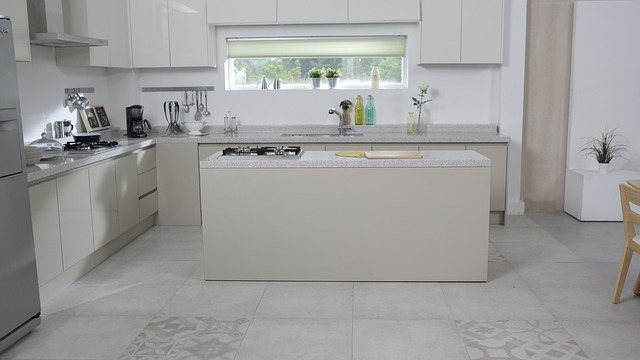When remodeling, choose eco-friendly countertops made from sustainable materials like recycled glass, cork, bamboo, or engineered stone for a stylish and green kitchen. These options reduce environmental impact, offer unique aesthetics, and ensure durability, making them a smart investment. From the modern shine of recycled glass to the warmth of cork, these materials enhance both function and beauty while promoting sustainability.
Looking to remodel your kitchen while reducing your environmental footprint? Discover cost-effective, green kitchen remodeling solutions that are both stylish and sustainable. From choosing eco-friendly countertop materials like recycled glass and bamboo to designing energy-efficient kitchens and selecting reclaimed wood cabinets, this guide covers everything you need to know. Learn how to incorporate durable, aesthetically pleasing options without breaking the bank. Implement these strategies for a beautiful, eco-conscious kitchen that benefits both your home and the planet.
- Choosing Eco-Friendly Countertop Materials
- – Exploring sustainable options like recycled glass, bamboo, and solid surface materials
- – Benefits of each material in terms of durability, aesthetics, and environmental impact
- Designing an Energy-Efficient Kitchen
Choosing Eco-Friendly Countertop Materials
When remodeling your kitchen, opting for eco-friendly countertop materials is an excellent way to reduce your environmental impact while creating a stylish and durable surface. Materials like recycled glass, cork, bamboo, or engineered stone are not only sustainable but also offer unique aesthetics that can elevate your space. Recycled glass countertops, for instance, provide a shiny, modern look while utilizing repurposed materials, making them both cost-effective and environmentally friendly.
Cork, known for its natural insulation properties, is an innovative choice, offering warmth and texture to the kitchen. Bamboo, a rapidly renewable resource, is another popular eco-friendly option that can mimic the look of granite with a more modern twist. Engineered stone, composed of recycled content, provides durability and a wide range of colors and patterns, ensuring your countertop becomes a striking focal point. These materials not only contribute to a greener kitchen but also offer long-lasting performance, making them a smart investment.
– Exploring sustainable options like recycled glass, bamboo, and solid surface materials
When remodeling your kitchen, one of the most significant decisions is choosing materials that align with your commitment to sustainability. Exploring sustainable options like recycled glass, bamboo, and solid surface materials offers an array of cost-effective green kitchen remodeling solutions. Eco-friendly countertops, for instance, not only reduce environmental impact but also add a unique aesthetic appeal. Recycled glass, often derived from repurposed bottles and surfaces, provides durability and versatility in various styles and colors.
Bamboo, known for its rapid growth and strength, is another excellent choice. It’s naturally antibacterial and can be crafted into countertops, cabinets, and flooring, offering both functionality and a touch of natural charm. Solid surface materials, like granite or quartz composite, are also popular among eco-conscious remodelers. These materials are durable, easy to maintain, and often contain recycled content, making them a sustainable choice that stands the test of time.
– Benefits of each material in terms of durability, aesthetics, and environmental impact
When considering green kitchen remodeling, choosing sustainable materials offers both aesthetic benefits and a reduced environmental footprint. Eco-friendly countertops, for instance, come in various options like recycled glass or recycled metal. These materials are highly durable, with some even claiming to last over 20 years, making them an excellent investment. Recycled glass countertops not only reduce landfill waste but also offer a unique, visually appealing look that can enhance the overall design of your kitchen. Similarly, recycled metal surfaces provide a modern, sleek aesthetic while minimizing the need for new raw materials, thereby lowering carbon emissions.
In addition to durability and style, these eco-friendly alternatives have minimal environmental impact. Natural stone, often used in traditional countertops, requires extensive quarrying and transportation, contributing to high carbon footprints. In contrast, recycled materials reduce energy consumption and greenhouse gas emissions associated with manufacturing. Furthermore, many of these green options are easy to clean and maintain, ensuring longevity and preserving their good looks over time, making them ideal choices for those seeking both style and sustainability in their kitchen remodels.
Designing an Energy-Efficient Kitchen
When remodeling your kitchen, prioritizing energy efficiency is both environmentally responsible and cost-saving. One of the simplest ways to achieve this is by choosing eco-friendly countertops. Modern materials like recycled glass, bamboo, or certified sustainable granite offer not only a sleek look but also excellent insulation, reducing heating and cooling demands. These options are durable and low-maintenance, ensuring your kitchen stays energy-efficient for years to come.
Additionally, consider implementing smart technology such as motion sensors for lighting and programmable thermostats for heating and cooling systems. These innovations help minimize energy waste by automatically adjusting settings based on occupancy and temperature needs. Combining these strategies with proper insulation and high-efficiency appliances will create a kitchen that’s both stylish and environmentally conscious, ensuring you stay within your budget while contributing to sustainability.
In conclusion, green kitchen remodeling doesn’t have to break the bank. By choosing eco-friendly countertops like recycled glass, bamboo, or solid surface materials, you can reduce your environmental footprint while enjoying durable and aesthetically pleasing surfaces. Additionally, designing an energy-efficient kitchen with smart appliances and proper insulation further minimizes costs and your carbon footprint. Embracing these cost-effective solutions allows you to create a beautiful, sustainable space that benefits both the planet and your wallet.
